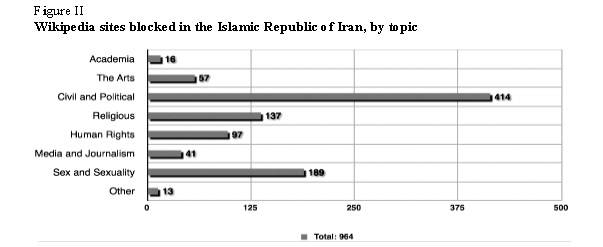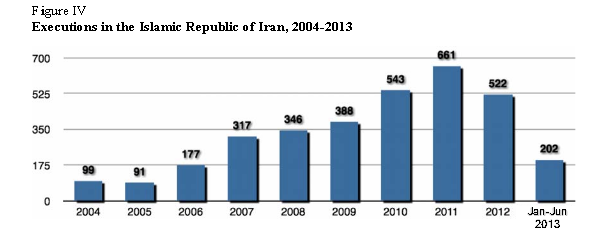On October 22, the U.N. Special Rapporteur on human rights in Iran released a new report on violations in the Islamic Republic. It stated that:
“At the heart of the deepening human rights crisis in the Islamic Republic of Iran is its disregard for the pre-eminence of rights and standards promulgated by treaties to which it is a party. Its culturally relativistic positions on human rights result in broad restrictions on fundamental rights and limit who can enjoy those rights on the basis of gender, ethnicity, ideology, political opinion, religion or culture.”
Iran criticized the U.N. report in a 56-page response. Tehran challenged Special Rapporteur Ahmed Shaheed’s sources and called his approach “politicized.” The following are key excerpts on various issues from the report and Iran’s response.
U.N. Report
Freedom of expression, access to information and association
6. A number of Iranian laws and policies, including the 1986 Press Law, the 2009 Computer Crimes Law and the 2010 Cybercrime Law, continue to flagrantly violate the right to freedom of expression and access to information under international law.
Also of concern are reports that the Government considers 600 Iranian journalists to be part of an anti-State network, that it has stated that journalists are arrested to prevent them from engaging in “seditious activities” and that the Government broadened the scope of sanctioned expression in February 2013 to include online content that either encouraged boycotts of the 2013 presidential election or mocked its candidates. In its comments, the Government asserts that freedoms are determined on the basis of their conformity with Islamic standards and that elected officials establish laws through a democratic process and therefore they do not violate freedom of expression or access to information.
7. Some 67 Internet cafes were reportedly closed in July 2013, authorities have reportedly announced that up to 5 million websites are blocked, and in April 2013 officials estimated that some 1,500 “anti-religious websites”, such as those containing pro-Wahhabi or Baha’i content, are blocked per month, as well as those dedicated to news, music and women’s rights, web pages maintained by ethnic minorities and social media sites.

8. At least 40 journalists, as well as 29 bloggers and online activists, are reportedly serving sentences in the Islamic Republic of Iran, and at least 23 journalists have reportedly been arrested since January 2013 (see figure I). This includes the arrest of 15 journalists between 25 and 27 January, the largest mass arrest of journalists in the country since 2009, as well as the arrest of 8 journalists on 6 and 7 March. All 40 journalists currently serving prison sentences were convicted for either national security crimes or crimes of a political nature, with 18 being convicted for “spreading propaganda against the State.”
9. Seven individuals were reportedly sentenced for crimes associated with their roles as lawyers and administrators of Majzooban Noor, a community news website that covered human rights abuses against members of the Dervish community. Their prison sentences range from 7.5 to 10.5 years for crimes including “organizing an illegal group with the intent to disturb national security” and “propaganda against the regime”. Sources reported that as at 18 July, the defendants had refused to submit an appeal as a form of protest against unfair trial standards, including inadequate access to legal counsel.
Executions
22. Of particular alarm are reports thatsome 724 executions took place between January 2012 and June 2013; of those, 202 were reportedly carried out in the first half of 2013, 135 of which were officially announced by the Government (see figure IV). The majority of executions in the Islamic Republic of Iran continue to be related to drug-trafficking cases, including a number of public executions. Some 786 executions, in violation of international law, have been reported for drug trafficking since the Special Rapporteur began monitoring the human rights situation in the Islamic Republic of Iran.

Other forms of cruel and inhuman punishment
28. In 1997, the Human Rights Committee equated flogging, amputation, and stoning with torture, rendering those punishments incompatible with human rights standards. The Special Rapporteur is perturbed by reports about sentences of limb amputation for the crime of theft and by reports about the flogging of 123 individuals between 1 July 2012 and 30 June 2013 for such crimes as “sedition”, “acts incompatible with chastity”, drinking alcohol, “illicit” relationships and non-penetrative homosexual acts. An equally disturbing report issued by the Iran State News Agency (ISNA) stated that 10,814 flogging sentences were implemented in the Mazandaran Province alone over the course of eight months in 2012.
Women’s Rights
34. Of concern are laws and policies that continue to limit women’s access to decision-making roles and that erode the advancements made by women in education. The Government has not reconsidered policies that result in the admission of more men than women in certain fields at universities across the country, that prohibit women from enrolling in certain fields of study (77 fields and hundreds of courses for the 2012/13 academic year) or that replace women’s studies curricula with courses on “women’s rights in Islam” at universities.
35. In its comments to the present report, the Islamic Republic of Iran contends that all female candidates were disqualified because of their lack of “executive and political experience” and that gender was not a consideration. The Government has also called attention to attempts to address domestic violence legally and to establish initiatives to treat victims of domestic violence and eliminate discrimination against women and that would allow women to attend decision-making sessions of government meetings that address environmental, economic and health issues.
Response by Iran’s U.N. Mission
Freedom of expression, access to information and association
As inferred from various principles of the Constitution of Islamic Republic of Iran, the scope of freedoms are determined by three criteria namely opposition or nonconformity with Islamic standards, public interest and rights as well as the rights of others. Observance of the Islamic standards have always been noted and emphasized.
Executions
The Special Rapporteur has based his draft report on a report by the Iranian opposition as well as some other unreliable sources. He is using unverified figures and by using terms such as "alarming reports of execution" tries to inculcate an undocumented issue.
Other forms of cruel and inhuman punishment
The Special Rapporteurs claim on the presence of conflict between some recognized punishments in the Islamic Penal Code and human rights regulations is due to his lack of attention to both cultural diversity and Sharia provisions.
Women’s Rights
The I.R. Iran is obliged according to its Constitution and its willingness to cooperate with international bodies and belief to guaranteeing the rights of women has adopted in 2012 the law on protecting the family. In the law, developments on observing rights of women and children are envisioned. Those rights are inter alia presence of judge counselor in courts, appointing lawyer by court for those without sufficient financial resources, provision of alimony to the wife from the court which is considering the family dispute, possibility for the wife to file disputes in her area of residency, envision of council centers for family in which at least half members should be married women, obligatory registration of permanent marriage its dissolution, divorce, and registration of temporary marriages where the law stipulates, conducting medical examination before marriage to ensure couples health and health of their children, child fostering, provision of regular allowances for the wife from the salary of the dead husband even after remarriage…
In response to the claim of the draft report on the limitation of political participation of Iranian women, it is reiterated that in the laws of the Islamic Republic of Iran no limitation is placed on the political participation of women and holding of political vacancies by them. In the process of qualification of presidential candidates of the June 2013 presidential elections, gender was not considered as a criterion, and women who registered their candidature were disqualified merely for lack of required executive and political experiences.
